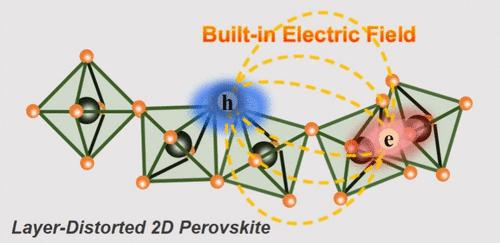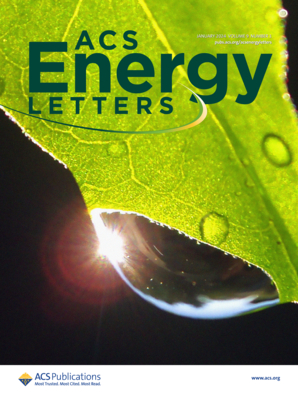二维过氧化物自发电荷分离的层畸变工程
IF 18.2
1区 材料科学
Q1 CHEMISTRY, PHYSICAL
引用次数: 0
摘要
在具有单无机层(n = 1)的高约束 I 型二维 (2D) 包晶石中进行电荷分离仍然具有挑战性,因为它们的激子结合能过高。在此,我们通过调整环烷基胺配体的大小,在 Ruddlesden-Popper (RP) 型包晶石(n = 1)中设计了层畸变。由于环丙基铵和环丁基铵的高度紧密性和刚性,包晶层的扭曲和波纹更多,从而促进了 Pb-Pb 和 I-I 离子二聚体的形成,使其成为电荷载流子的自定位点。因此,利用无阈值光泵,在不施加任何外部电场的情况下,实现了自发电子-空穴分离以及长效(1 μs)本征量子约束斯塔克效应(QCSE),产生了前所未有的光诱导带隙能量降低。这项工作为 I 型二维量子阱中的高效电荷分离开辟了新的可能性,可用于光伏和非线性光学调制应用。本文章由计算机程序翻译,如有差异,请以英文原文为准。

Layer Distortion Engineering for Spontaneous Charge Separation in Two-Dimensional Perovskites
Charge separation in highly confined type-I two-dimensional (2D) perovskites with a single inorganic layer (n = 1) remains challenging due to their excessive exciton binding energy. Herein, we engineer the layer distortion within Ruddlesden–Popper (RP) type perovskites (n = 1) by tailoring the sizes of the cycloalkylamine ligands. The perovskite layers are more distorted and corrugated to accommodate the highly compact yet rigid cyclopropylammonium and cyclobutylammonium, facilitating the formation of Pb–Pb and I–I ionic dimers as self-localizing sites for charge carriers. Consequently, spontaneous electron–hole separation as well as a long-lived (>1 μs) intrinsic quantum confined Stark effect (QCSE) is achieved using the thresholdless optical pump and without applying any external electric field, yielding an unprecedent amount of the photoinduced bandgap energy lowering. This work opens up new possibilities of efficient charge separation in type-I 2D quantum wells for the photovoltaic and nonlinear optical modulation applications.
求助全文
通过发布文献求助,成功后即可免费获取论文全文。
去求助
来源期刊

ACS Energy Letters
Energy-Renewable Energy, Sustainability and the Environment
CiteScore
31.20
自引率
5.00%
发文量
469
审稿时长
1 months
期刊介绍:
ACS Energy Letters is a monthly journal that publishes papers reporting new scientific advances in energy research. The journal focuses on topics that are of interest to scientists working in the fundamental and applied sciences. Rapid publication is a central criterion for acceptance, and the journal is known for its quick publication times, with an average of 4-6 weeks from submission to web publication in As Soon As Publishable format.
ACS Energy Letters is ranked as the number one journal in the Web of Science Electrochemistry category. It also ranks within the top 10 journals for Physical Chemistry, Energy & Fuels, and Nanoscience & Nanotechnology.
The journal offers several types of articles, including Letters, Energy Express, Perspectives, Reviews, Editorials, Viewpoints and Energy Focus. Additionally, authors have the option to submit videos that summarize or support the information presented in a Perspective or Review article, which can be highlighted on the journal's website. ACS Energy Letters is abstracted and indexed in Chemical Abstracts Service/SciFinder, EBSCO-summon, PubMed, Web of Science, Scopus and Portico.
 求助内容:
求助内容: 应助结果提醒方式:
应助结果提醒方式:


